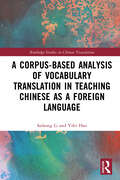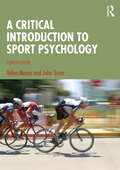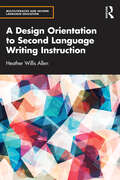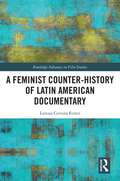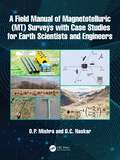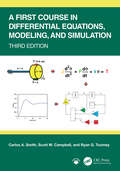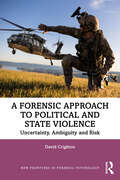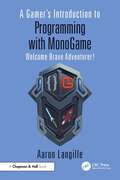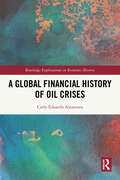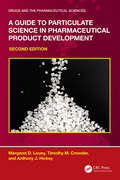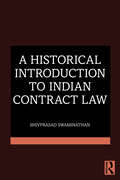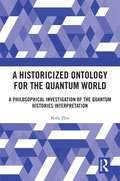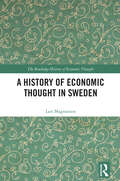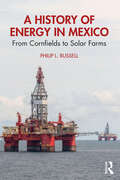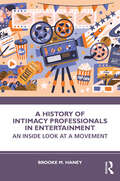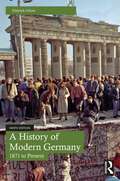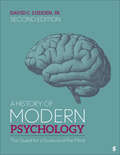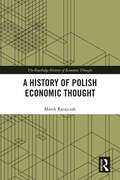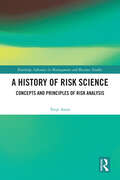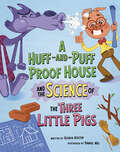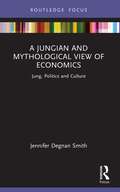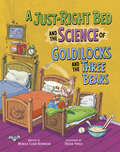- Table View
- List View
A Corpus-based Analysis of Vocabulary Translation in Teaching Chinese as a Foreign Language (Routledge Studies in Chinese Translation)
by Saihong Li Yifei HaoThis monograph investigates the landscape of vocabulary translation challenges within Teaching Chinese as a Foreign Language (T.C.F.L.) textbooks. In the era of globalisation, where the demand for Chinese language proficiency has escalated due to cultural exchanges, economic collaborations, tourism, and overseas learning, this study examines the accuracy and effectiveness of vocabulary translations in T.C.F.L. textbooks. The authors adopt an innovative approach, centring on analysing audience responses, including feedback from teaching practitioners and learners of Chinese languages and utilising corpus-based data to evaluate the consistency and appropriateness of vocabulary translations. This book is an essential resource for scholars and educators, as well as students in education, Chinese studies, translation studies, and language learning.
A Critical Introduction to Sport Psychology
by Aidan Moran John TonerThis new fourth edition remains the only textbook in the field which provides a detailed overview of key theories, concepts and findings within the discipline of sport psychology, as well as a critical perspective that examines and challenges these core foundations.Fully revised and updated, the new edition covers topics affecting both participation and performance in sport, including motivation, anxiety, emotional coping, concentration, mental imagery, expertise, and team cohesion. In addition, the book includes a range of helpful features that bring the science to life, including critical thinking exercises, suggestions for student projects, boxes highlighting key advances in theory or practice, and end-of-chapter summaries. The final chapter examines some new horizons in sport psychology, including embodied cognition, and a comprehensive glossary is also included.Sport is played with the body but often won in the mind; that is the theory. A Critical Introduction to Sport Psychology is the definitive textbook for anyone wishing to engage critically with this fascinating idea.
A Design Orientation to Second Language Writing Instruction (Multiliteracies and Second Language Education)
by Heather Willis AllenA Design Orientation to Second Language Writing Instruction presents the principles of a Design orientation to second language writing and argues for new directions in second language writing instruction.This book elaborates an approach to L2 writing instruction relevant for the diverse multilingual educational contexts and ever-changing literacies of the 21st century. A comprehensive introductory chapter which synthesizes recent history and current challenges in writing instruction for languages other than English is followed by chapters that link theory and practice, articulate principles of Design writing, and provide practical guidance for how instructors can implement Design writing instruction in ways that increase the relevance and value of writing for today's diverse learners.As well as being a valuable resource for researchers of second language acquisition and second language instructors at all levels of instruction, A Design Orientation to Second Language Writing Instruction will also appeal to teacher educators and graduate students.
A Developmentalist's Guide to Better Mental Health: Navigating Everyday Life Dilemmas
by Lois HolzmanA Developmentalist’s Guide to Better Mental Health offers mental health professionals a practical, philosophical, and playful guide for working relationally and developmentally with dilemmas, muddles, and the emotions that accompany them.The book centers around dozens of letters from writers asking “the developmentalist” for help with a wide range of issues. Organized by topics and themes—including trauma, family and relationship issues, living with uncertainty, workplace problems, and more—the letters and the developmentalist's thoughtful, thought-provoking responses lay out a wide variety of strategies for inviting clients into developmental journeys. When shared with clients, the letters and responses are a rich resource for therapeutic conversations. The book includes theoretical and conceptual background information as well as commentary from mental health professionals who already use the letters and responses in their practices.A Developmentalist’s Guide to Better Mental Health is unlike other practical guides in both its format and in its focus on development, especially emotional and social development, as a creative activity.
A Feminist Counter-History of Latin American Documentary (Routledge Advances in Film Studies)
by Lorena Cervera FerrerA Feminist Counter-History of Latin American Documentary provides a new lens through which to revisit the history of Latin American cinema and proposes three approximations to the study of women’s documentary produced between the early 1970s and the mid-1990s.With a focus on documentaries with clear political intents, this book illustrates some of the thematic interests, authorial modes, production practices, formal devices, and aesthetic strategies employed by women filmmakers. Through analysis of the contexts, processes, and forms of a selection of films, the author shows how these non-fiction films shed light on the precarious conditions that characterised women’s greater entry into the workforce, on the circulation of feminist ideas, and on the inevitable questioning of identity that resulted from migration and displacement.This volume will appeal to scholars and students interested in women’s and feminist cinema, documentary history, theory, and practice, and Latin American history and culture.
A Field Manual of Magnetotelluric (MT) Surveys with Case Studies for Earth Scientists and Engineers
by O. P. Mishra D. C. NaskarThis book details both conventional and advanced geophysical techniques with description of the Electromagnetic (EM) based physics involved in different methodologies of magnetotellurics (MT). It offers detailed discussions of the theory of EM and MT methods, and the operation of specific instruments, including the presentation of results and their interpretation in tabular format. The chapters describe the conceptual background of MT geophysical methods along with the related instrumentation, sufficient illustrations, and the applicability of the individual methodologies supported by successful case histories.Features: Provides a comprehensive introduction to the MT–geophysical method. Covers diverse geotectonic settings with several case studies, supported by diagrams and data tables. Describes the fundamentals of uncontrollable telluric and controllable non-telluric sources used in MT surveys. Reviews MT methods with emphasis on recent improvements, recognizing both static and distortion effects and their treatment in the analysis of impedance tensors in 3-D inversion codes. Explores integrated MT interpretation coupled with seismic and potential (gravity, magnetic) geophysical methods. This book is aimed at professionals, students, and researchers in geophysics, geology, civil, mechanical, petroleum, and geothermal engineering, and other branches of earth and environmental sciences.
A First Course in Differential Equations, Modeling, and Simulation
by Carlos A. Smith Scott W. Campbell Ryan G. ToomeyA First Course in Differential Equations, Modeling, and Simulation shows how differential equations arise from applying basic physical principles and experimental observations to engineering systems. Avoiding overly theoretical explanations, the textbook also discusses classical and Laplace transform methods for obtaining the analytical solution of differential equations. In addition, the authors explain how to solve sets of differential equations where analytical solutions cannot easily be obtained. Incorporating valuable suggestions from mathematicians and mathematics professors, the third edition: Reworks the chapter “Response of First and Second Order Systems” to include the system response to step changes, impulses, rectangular pulses, and sinusoid forcing functions as well as the response of coupled first- and second-order ordinary differential equations (ODEs); it also introduces Bode plots to analyze the frequency response of second-order ODEs and the principle of oscillation modes in coupled second-order ODEs Adds a new section on springs and dampers in series or parallel Includes new content on Simulink® and modeling Contains new exercises that can be used as projects and answers to many of the end-ofchapter problems Features new end-of-chapter problems and updates throughout This textbook provides students with a practical understanding of how to apply differential equations in modern engineering and science.A solutions manual and files of all figures in the text are available to adopting professors.
A Forensic Approach to Political and State Violence: Uncertainty, Ambiguity and Risk (New Frontiers in Forensic Psychology)
by David CrightonA Forensic Approach to Political and State Violence applies a forensic lens to the study of risk in relation to political and state violence.Divided into three parts, the book outlines the nature and function of political and state violence and the historic development of contributions from forensic practice. It then considers the distinction between political and state violence and the foundations for this. This is followed by a review of developments of current research and practice looking at future development and the ways in which forensic practice might more effectively contribute to risk reduction and management. The text will argue that the basis of much current forensic practice, in relation to political and state violence, is unduly limited and has failed to integrate relevant scientific research into practice. The role of market-led approaches to work in these areas will also be considered, in relation to the way this has influenced and distorted practice and delayed progress. Drawing on theories derived from psychology and other areas of research, the book considers how evidence might inform improvements, using the risks and uncertainties that surround politically motivated violence to illustrate this. Real cases of political and state violence are considered, with topics including military conflict, terrorism, use of torture and hostage taking to highlight current failings and weaknesses. Barriers to implementing better forensic practice in terms of both professional, economic and policy interests are also explored.It will be an essential read for all students or practitioners in the areas of forensic psychology, criminal justice or violence risk management.
A Gamer's Introduction to Programming with MonoGame: Welcome Brave Adventurer!
by Aaron LangilleA Gamer’s Introduction to Programming with MonoGame: Welcome Brave Adventurer! is a great way to combine your current love of both video games and coding into a brand‑new love of writing your own games. In this book, you’ll learn the essential ins‑and‑outs of how to work with fonts and text, images and sprites, audio, and even animation. You’ll learn how to give your players control over their destiny through keyboards, mice, and gamepads, and you’ll harness the never‑ending energy of the gameplay loop functions. But coding books are technical, boring, and scary, aren’t they? Not this one. Within these pages, you’ll find a fun and approachable adventure that will introduce you to the accessible but powerful MonoGame development framework. Using Visual Studio and C#, you’ll write simple but engaging interactive scenes and games that will gradually build up your coding skills and confidence. Packed with practical examples, plain‑language explanations, images, and illustrations, this book is structured like a video game, complete with levels to progress through, cutscenes to give you extra information, and final challenge projects to show you how everything fits together and to help build your own creative portfolio. It is also the second book in an ongoing series designed to take you from zero experience to writing your own video games and interactive digital experiences using industry standard languages and tools. For readers with previous object‑oriented programming experience, this book is a standalone introductory MonoGame adventure. Gain even more experience by exploring the resources, bonus materials, and extensive code samples available at the companion website: https://welcomebraveadventurer.ca. Now, gather your courage and prepare to level up by joining the MonoGame coding quests that await you inside.
A Global Financial History of Oil Crises (Routledge Explorations in Economic History)
by Carlo Edoardo AltamuraIn this book, Altamura analyses the oil shocks of 1973 and 1979, considering their impact on the world economy and subsequent reactions to the global instability.In terms of actors, the focus is on how international organisations such as the IMF, World Bank and OECD responded to the crisis, as well as the behaviour of commercial banks and central banks and of countries in the Global South. Altamura draws on newly available archival material from private financial institutions to paint a full picture of a rapidly changing world which paved the way for stagflation and interdependency.This monograph will be illuminating reading for economic and financial historians, plus scholars looking at energy history, the Cold War in a global context, the New International Economic Order and the political economy of the 1970s.
A Guide to Particulate Science in Pharmaceutical Product Development (Drugs and the Pharmaceutical Sciences)
by Anthony J. Hickey Margaret D. Louey Timothy M. CrowderThe pharmaceutical applications of powder technology have long been recognized. Yet while many books focus on aspects of powder formation and behavior, there are few texts that explore the power of particulate science in the design, manufacture, and control of quality medicines. This revision discusses key principles and practical applications. The authors cover particulate material, its form and production, sampling from bodies of powder, particle size descriptors and statistics, behavior of particles and powder, instrumental analysis, particle size measurement and synergy of adopted techniques, and in vitro and in vivo performance criteria. Case studies are included in this new edition.This fully revised edition: Provides an essential account of particulate science including several new chapters on multicomponent particles, regulatory considerations and product development Presents a variety of topics ranging from the quality of published data on particle size in pharmaceuticals to the future of crystal engineering Reviews methods of particle measurement and their importance for specific applications Discusses misconceptions and misunderstandings of particulate science together with lessons from other industries
A Historical Introduction to Indian Contract Law
by Shivprasad SwaminathanThis book offers a genealogy of the core concepts of Indian contract law, tracing their trajectory from the nineteenth century soil of English jurisprudence in which they germinated, to their transplantation into the Indian Contract Act 1872, and the interpretation of the provisions containing these concepts by Indian courts and influential treatise-writers, over the last one hundred and fifty years.The concepts studied by the book are: i) formation; ii) consideration; iii) privity; iv) capacity; v) consent; vi) frustration; vii) damages viii) stipulated sums; and ix) unjustified enrichment. With respect to each of these concepts, the book seeks to provide an account of the state of the English law at the eve of the drafting of the Act, with a particular emphasis on the impact the civil law had on the concept and a close study of the legislative history of the provisions of the Act codifying the concept, with a view to uncovering what the drafters had originally envisaged.Based on extensive doctrinal and archival research, the book offers:• a historical background to the drafting of the Indian Contract Act and the codification process.• a jurisprudential exploration of the limitations of common law codification gleaned from the working of the Act.• the draft of the contract code accompanying the report of the Indian Law Commissioners in 1866, which is essential to understand the intention of the drafters of the Act.• historical insights which hold the key to illuminating contemporary contract law problems of the kind courts routinely grapple with.
A Historicized Ontology for the Quantum World: A Philosophical Investigation of the Quantum Histories Interpretation
by Kefu ZhuThis book discusses the ontology in the quantum world and argues that it should be interpreted as a historicized ontology. This perspective is advocated by the quantum histories interpretation.Inspired by the nomological interpretation from Bohmian mechanics and the corresponding understanding of the law of nature and logic, the ontology will be useful to solve the difficulties of confusing ontology and perplexing logical inference. Furthermore, this book proposes that the historicized ontology can be generalized to more complicated structures and fit naturally into temporal correlation. Core philosophical issues such as the law of nature, the ontology of events, history, and processes, and the metaphysics of history are coherently discussed, revealing the profound meaning behind the formalism of quantum histories. By providing a new framework for a historicized picture of ontology, it will effectively promote the debates in the philosophy of physics and the fundamental research in quantum mechanics.This book will appeal to scholars and students of the philosophy of science, metaphysics, and quantum theory.
A History of Economic Thought in Sweden (The Routledge History of Economic Thought)
by Lars MagnussonSituating key texts and writers in their proper historical context, this book presents a history of Swedish economic thinking from early modern times to the present day.Highlighting key elements of Swedish political, economic and social history allows the book to shed new light on important parts of the story including the development of neo-classical economics from the late 19th century - associated with leading names such as Knut Wicksell, Gustav Cassel and Eli Heckscher – and the rise of the so-called Stockholm school in the 1920´s and 30´s. But the book also goes back further to explore the Swedish economic literature of the 18th century, particularly its more “liberal” version of mercantilism and cameralism, as well as early modern and medieval developments. Throughout, the book emphasizes the unique nature of much of the economic thinking emanating from Sweden. Emulation and adaption of political economic thinking imported from abroad – primarily the UK, France and German speaking countries - is an important part of this story, but this is shown to be an active process which has resulted in great originality in Swedish economic thought.This book will be of interest to readers in the history of economic thought, economic history, the history of ideas and Swedish history.
A History of Energy in Mexico: From Cornfields to Solar Farms
by Philip L. RussellThis volume synthesizes energy history in Mexico from pre-Conquest times to the present. It traces human development from a low-energy, sustainable existence to fossil fuel-based non-sustainability.The book familiarizes readers with different energy sources, what the advantages and disadvantages of each source are, and how the importance of each energy source has changed over time. From early agricultural beginnings and Spanish-introduced energy innovations to the rise of coal and oil, the volume analyzes how evolving energy sources produced sweeping environmental and social change. It also studies economic history from the approach of the emerging field of biophysical economics, recognizing the often-overlooked role of energy in Mexico’s development. Linking this development to climate change, the book discusses the ways in which Mexico and the Global South are impacted by this crisis, despite doing little to cause climate change themselves. Later chapters inform readers of how energy issues have shaped U.S.–Mexican relations throughout the twentieth century and into today.A History of Energy in Mexico will be of value to students of environmental, economic, and Mexican history as well as political scientists, economists, and anthropologists.
A History of Intimacy Professionals in Entertainment: An Inside Look at a Movement
by Brooke M. HaneyA History of Intimacy Professionals in Entertainment is the first book that explores the evolution of intimacy coordinators, choreographers and directors in the performing arts, highlighting the history of their critical role in fostering safe(r) and respectful environments on set and in theaters.Readers will gain a deep understanding of the history and importance of intimacy work in the entertainment industry, as told by an insider, along with insights into the creation of best practices and protocols and the emergence of training organizations. Focused primarily on the USA, part one dives into the cultural events that impacted and galvanized the role of intimacy professionals, like TIME'S UP, #MeToo, Black Lives Matter and the Covid-19 pandemic. It also looks at how unions and the press responded to and affected the movement, as well as other communities that influenced the creation of protocols. Part two consists of interviews with global thought leaders, analysis and resources. A love letter to the intimacy industry, A History of Intimacy Professionals in Entertainment is meant for producers, directors, actors, educators, students in performing arts programs and anyone who advocates for safer practices in entertainment. Intimacy professionals will also greatly benefit from having the knowledge of how we got here recorded.
A History of Modern Germany: 1871 to Present
by Dietrich OrlowNow in its ninth edition, A History of Modern Germany provides the most up-to-date and comprehensive survey of this complex country’s history, beginning in 1871 and ending in the present day.Orlow tells the story of Germany’s troubled past—Prusso-German authoritarianism, the Nazi dictatorship, and the Holocaust—whilst also uncovering the long-standing traditions of political, cultural, and economic pluralism that have existed alongside. Over the years, historians have debated the cause of Germany’s volatile and unpredictable trajectory; this textbook offers readers insight into this lively historiography. While taking Germany as its focus, this book also covers its interaction with the rest of the world, including the two world wars and Germany’s brief colonial experience. This ninth edition is the only textbook that brings the story to the present day; its new chapter on the years 2017-2024 delves into Germany’s role in the global balance of power.With Im Mittelpunkt (‘In the Spotlight’) features on key figures and an expanded list of ‘Suggestions for Further Reading’, this new edition remains the perfect grounding for all students of German history.
A History of Modern Psychology: The Quest for a Science of the Mind
by David LuddenA History of Modern Psychology: The Quest for a Science of the Mind describes the evolution of psychology into the twenty-first century with coverage of recent events and findings that transform our understanding of the past. With a topical approach that presents key thinkers within the context of schools of thought, students are able to see how philosophers, researchers, and academics influenced one another to create the rich and diverse landscape of modern psychology in a global context. In the new Second Edition, the author expands coverage of unsung pioneers (philosopher Al-Balkhi, zoologist Charles Henry Turner, psychiatrist Grunya Sukhareva, and others), revisits the legacy of Francis Galton, explores the "Vygotsky boom," and includes new discussion of the impact of Philip Zimbardo′s Stanford Prison Experiment. Through detailed timelines and features such as "Looking Back" and "Looking Ahead," Ludden gives students a deeper appreciation for the transference of knowledge that shaped the field.
A History of Modern Psychology: The Quest for a Science of the Mind
by David LuddenA History of Modern Psychology: The Quest for a Science of the Mind describes the evolution of psychology into the twenty-first century with coverage of recent events and findings that transform our understanding of the past. With a topical approach that presents key thinkers within the context of schools of thought, students are able to see how philosophers, researchers, and academics influenced one another to create the rich and diverse landscape of modern psychology in a global context. In the new Second Edition, the author expands coverage of unsung pioneers (philosopher Al-Balkhi, zoologist Charles Henry Turner, psychiatrist Grunya Sukhareva, and others), revisits the legacy of Francis Galton, explores the "Vygotsky boom," and includes new discussion of the impact of Philip Zimbardo′s Stanford Prison Experiment. Through detailed timelines and features such as "Looking Back" and "Looking Ahead," Ludden gives students a deeper appreciation for the transference of knowledge that shaped the field.
A History of Modern Psychology: The Quest for a Science of the Mind
by David LuddenA History of Modern Psychology: The Quest for a Science of the Mind describes the evolution of psychology into the twenty-first century with coverage of recent events and findings that transform our understanding of the past. With a topical approach that presents key thinkers within the context of schools of thought, students are able to see how philosophers, researchers, and academics influenced one another to create the rich and diverse landscape of modern psychology in a global context. In the new Second Edition, the author expands coverage of unsung pioneers (philosopher Al-Balkhi, zoologist Charles Henry Turner, psychiatrist Grunya Sukhareva, and others), revisits the legacy of Francis Galton, explores the "Vygotsky boom," and includes new discussion of the impact of Philip Zimbardo′s Stanford Prison Experiment. Through detailed timelines and features such as "Looking Back" and "Looking Ahead," Ludden gives students a deeper appreciation for the transference of knowledge that shaped the field.
A History of Polish Economic Thought (The Routledge History of Economic Thought)
by Marek RatajczakFrom its beginnings, Polish economic thought has had a strong national character resulting from specific socio-political and economic realities.Drawing on the broader historical context, this book presents the main stages and contributions in the development of Polish economic thought from the medieval period to modern times. Focusing on economists and economic schools active within Poland, the book presents the development of Polish economic thought in the context of Polish history, economic history, sociocultural conditions, and the history of economics. The book features prominent figures such as Oskar Lange, Michał Kalecki, and Rosa Luxemburg, but the emphasis is on broader trends and developments across key periods. From the 16th century until the loss of independence in 1795, discussion on economic activity was part of a broader analysis of social relations. During the years of the partitions, the paramount issue for all Polish economists was regaining independence, which gave rise to the idea of Polish national economics. Independence in 1918 was a fundamental impulse for the development of theoretical research, led by the achievements of Lange and Kalecki. After World War II, the political and economic changes again influenced the development of Polish economics, being forced to consider the realities of a non-market economy. The tremendous political, economic, and social changes that began in 1989 led to significant shifts in Polish economic thought, with a particular emphasis on the research on the transition from a planned to a market economy.The book will be vital reading for those interested in the history of economic thought, economic history, Polish history, and European history more broadly.
A History of Risk Science: Concepts and Principles of Risk Analysis (Routledge Advances in Management and Business Studies)
by Terje AvenRisk has been handled as long as there have been humans on Earth. However, the risk field is a young discipline; systematic attempts to access and handle risk – explicitly conceptualizing and expressing risk – in society are a recent endeavour. This book presents a history of risk science and risk analysis highlighting concepts and principles for understanding, assessing, communicating, managing and governing risk.The author presents and discusses key contributions to risk science using a historical lens and from the perspective of a risk scientist. The book strengthens our understanding of what risk science is and how it has evolved by exploring fundamental topics such as risk characterization, risk perception, risk communication, risk handling and decision-making and concludes with reflection on the future of risk science, and in particular what we can learn from its history.A History of Risk Science will be essential reading for risk researchers and graduate students as well as scholars from associated fields applying risk-related analysis to their work.
A Huff-and-Puff Proof House and the Science of the Three Little Pigs
by Gloria KosterEverybody knows know the classic story of the three little pigs and the big bad wolf. The wolf had no trouble blowing down the houses made from straw and sticks. But wait . . . Why couldn't he blow down the brick house, exactly? The youngest pig retells the classic tale from his point of view. Then he uses the scientific method and multiple experiments to teach his brother and sister the science behind his super-strong house.
A Jungian and Mythological View of Economics: Jung, Politics and Culture (Focus on Jung, Politics and Culture)
by Jennifer Degnan SmithThis book aims to re-vision economics by taking a Jungian view of the recent global economic crisis of the 2010s, focusing on Greece’s challenging experience in particular.Recognizing the genius loci of Greece by taking a terrapsychological approach allows Greece to be an active participant in the discussions rather than purely an object to be studied. Observing the crisis through the lenses of mythology, cultural complexes, and the God-image deepens the understanding of modern-day economics. These viewpoints reveal the unconscious and archetypal elements at play in the dysfunctions. Exposing the foundational issues is critical to redeeming economics and confirms the value in seeing socioeconomic issues from a Jungian perspective. The issues revealed through the exploration are not unique to Greece, but rather reflect many of the fundamental problems of the current global economic system. Thus, like its ancient myths, Greece’s modern-day story of suffering has insights for today’s world.The audience for this book includes and extends beyond Jungian psychology, and will also appeal to some in the field of economics and those interested in the application of Jungian ideas to sociocultural issues.
A Just-Right Bed and the Science of Goldilocks and the Three Bears
by Monica Clark-RobinsonGoldilocks didn't break into the Three Bears' house. Actually, her name is Golda Locke, and she's a scientist who just wants to do research! Golda clarifies what really happened that fateful day in the woods. Turns out the scientific method and the power of observation played a big role in her story.
